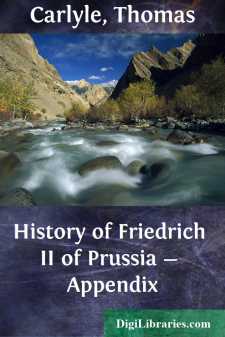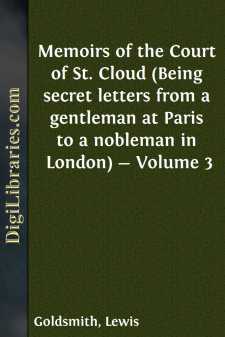History
- Africa 30
- Americas (North Central South West Indies) 50
- Ancient 68
- Asia 58
- Australia & New Zealand 8
- Canada 41
- Caribbean & West Indies 1
- Civilization 20
- Eastern Europe 12
- Europe 310
- Expeditions & Discoveries 60
- General 77
- Historical Geography 1
- Jewish 9
- Latin America 3
- Medieval 8
- Middle East 13
- Military 248
- Revolutionary 8
- Study & Teaching 5
- United States 353
- Western Europe 56
- World 13
History Books
Sort by:
by:
Various
I GENERAL SURVEY F.S. MARVIN We are trying in this book to give some impression of the principal changes and developments of Western thought in what might roughly be called 'the last generation', though this limit of time has been, as it must be, treated liberally. From the political point of view the two most impressive milestones, events which will always mark for the consciousness of the...
more...
by:
Thomas Carlyle
A DAY WITH FRIEDRICH.—(23d July, 1779.) "OBERAMTMANN (Head-Manager) Fromme" was a sister's son of Poet, Gleim,—Gleim Canon of Halberstadt, who wrote Prussian "grenadier-songs" in, or in reference to, the Seven-Years War, songs still printed, but worth little; who begged once, after Friedrich's death, an OLD HAT of his, and took it with him to Halberstadt (where I hope it...
more...
CHAPTER I The remotest fact in the history of England is written in her rocks. Geology tells us of a time when no sea flowed between Dover and Calais, while an unbroken continent extended from the Mediterranean to the Orkneys. Huge mounds of rough stones called Cromlechs, have yielded up still another secret. Before the coming of the Keltic-Aryans, there dwelt there two successive races, whose story is...
more...
by:
Lewis Goldsmith
PARIS, August, 1805. MY LORD:—No Sovereigns have, since the Revolution, displayed more grandeur of soul, and evinced more firmness of character, than the present King and Queen of Naples. Encompassed by a revolutionary volcano more dangerous than the physical one, though disturbed at home and defeated abroad, they have neither been disgraced nor dishonoured. They have, indeed, with all other Italian...
more...
by:
John Ashton
CHAPTER I. The Queen’s Accession—Proclamation—Funeral of the King—The Queen and social functions—Mr. Montefiore—Amusing letter—Electric telegraph—Knocker wrenching—Amusements of the young aristocracy. King William the Fourth was as sincerely fond of his niece, Alexandrina Victoria, as he cordially detested her mother, and he earnestly hoped that she might obtain her majority, which...
more...
by:
Emma Helen Blair
Complaints Against the Archbishop Sire: Ever since I began to have dealings with the archbishop Don Fray Miguel de Benavides, and have recognized his temper, I have perceived the difficulties that he would cause me; accordingly, I have always acted with great moderation and care. But the occasions which he gives for such caution are so many that great patience is necessary to bear them; for he...
more...
by:
Rafael Sabatini
PREFACE In approaching "The Historical Nights' Entertainment" I set myself the task of reconstructing, in the fullest possible detail and with all the colour available from surviving records, a group of more or less famous events. I would select for my purpose those which were in themselves bizarre and resulting from the interplay of human passions, and whilst relating each of these events...
more...
RICHARD THE FIRST, Second sonne to Henrie the second. An. Reg. 1.1189. Richard the first of that name, and second sonne of Henrie the second, Wil. Paruus. began his reigne ouer England the sixt day of Julie, in the yere of our Lord 1189. in the seauen and thirteeth yeare of the emperour Frederike the first, in the eleuenth yere of the reigne of Philip the second king of France, and king William...
more...
by:
John Bates Clark
It is currently reported that the late King Edward once said, "We are all Socialists, now": and if the term "Socialism" meant to-day what His Majesty probably meant by it, many of us could truthfully make a similar statement. Without any doubt, we could do so if we attached to the term the meaning which it had when it was first invented. It came into use in the thirties of the last...
more...
Virginia, the birthplace of our nation, played an important role in the winning of American independence. Virginia, the largest and the most influential of the 13 colonies, led the struggle for American independence and has helped to formulate American ideals and to shape our country's institutions. Introduction This publication was prepared to assist teachers in developing topics of study...
more...











